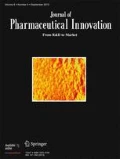The statements contained herein are my personal views, opinions, and statements and not those of my employer.
All of us working in the pharmaceutical industry, whether on the research and development or commercial side of the business, are keenly aware of the massive changes taking place within it. Pressures on the industry resulting from pricing challenges, payer reimbursement, and drive for increase in speed to market are resulting in pharmaceutical companies reconsidering their business models, driving for cost and productivity efficiencies, and looking keenly at the talent and skills needed to accomplish research, development, and commercialization in a facile manner.
For years, the industry and academia have approached this from disparate directions. Universities have taught students in the classic fashion, emphasizing such concepts as pharmaceutics, pharmacokinetics, and mechanistic understanding of bioavailability. While industry has recognized that these skills are a necessary foundation for the performance of innovative science and successful product development and commercialization, it has also acknowledged that other “everyday” skills such as compliance, process validation, facility design, and familiarity with working in a manufacturing environment have been their obligation to develop in their new professional hires.
As the famous folk song says “The times they are a changing.” Academic institutions today have recognized that they have an obligation to evolve with the times. One approach to this involves partnering with industry to explore what program modifications are necessary to provide hiring companies with graduates who are better prepared to “hit the ground running.” Some universities have formed advisory boards consisting of professionals in the pharmaceutical industry that help them to design programs that will attract student candidates and result in qualified graduates that can secure worthwhile employment. Consider the included article by Professor Elaine Pratt from Stevens Institute of Technology. Professor Pratt and her colleagues within the engineering department at Stevens have put together in consort with advice from industrial professionals a program that grants a Master of Science degree in Pharmaceutical Manufacturing. Having served on this board for 2 years, I can attest wholeheartedly to the desire of Stevens to meet the needs of its students and the pharmaceutical industry.
The Journal of Pharmaceutical Innovation has sought to promote innovation in the industry on all fronts and novel academic curricula certainly qualify as innovative! For all academic readers of this journal, Jim Drennen and I invite you to submit manuscripts describing your own innovative programs for the education of our next generation of pharmaceutical leaders.
Stephen Scypinski
Author information
Authors and Affiliations
Corresponding author
Rights and permissions
About this article
Cite this article
Scypinski, S. Editorial: Progress in Pharmaceutical Academic Programs (or Training the Next Generation of Pharmaceutical Leaders). J Pharm Innov 12, 189 (2017). https://doi.org/10.1007/s12247-017-9292-y
Published:
Issue Date:
DOI: https://doi.org/10.1007/s12247-017-9292-y

